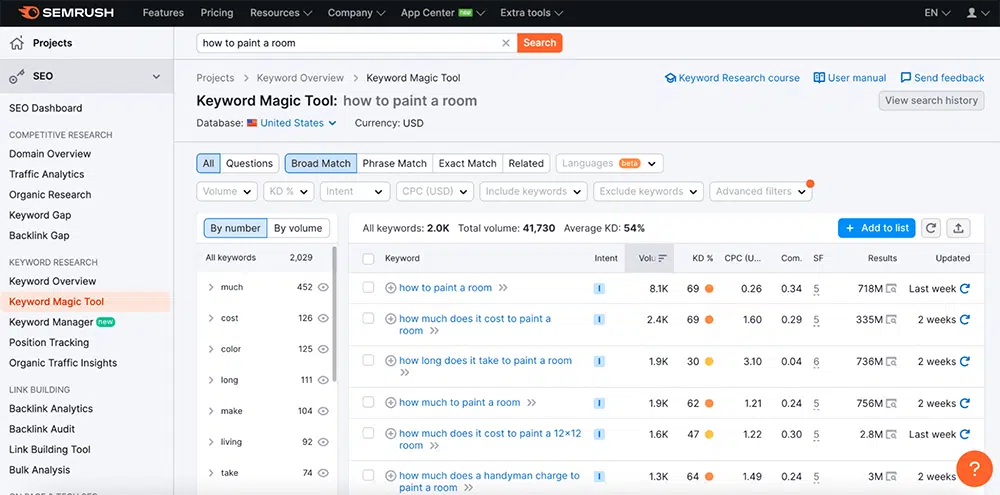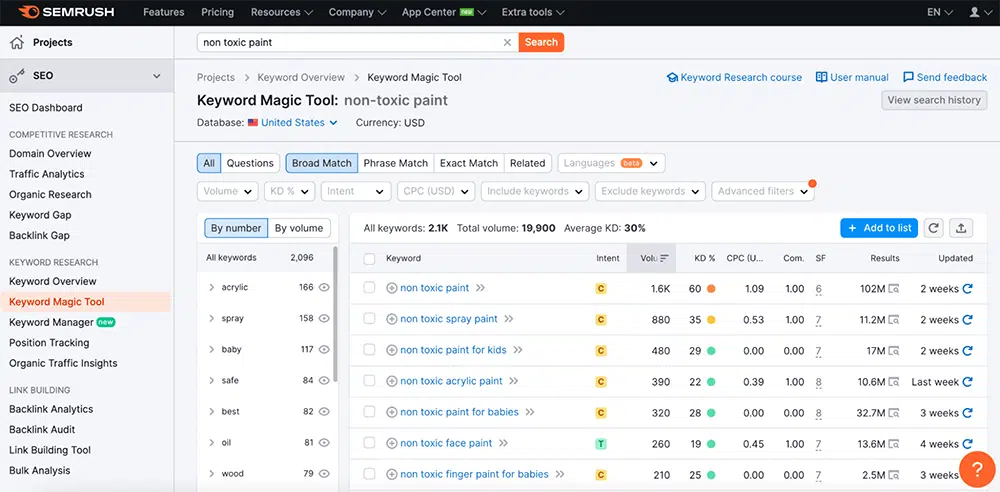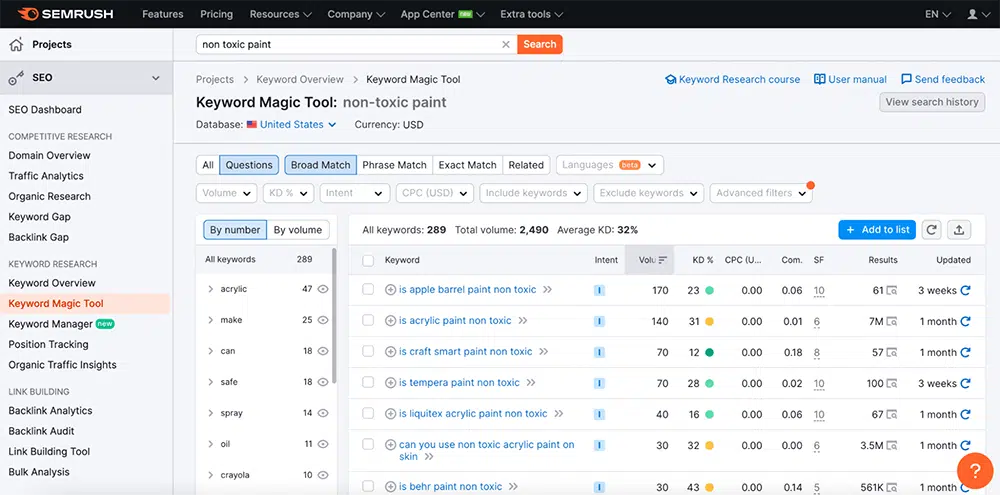
What is a keyword? You were probably familiar with keywords long before you thought about learning SEO.
If you use a search engine, a keyword is simply a word or phrase you enter into a search bar in order to browse results that might have the specific information you need.
This could be anything from a local search for food, such as “pizza delivery near me”:

Or a home-improvement search, such as “how to paint a room”:

The hungry freelancer who wants a quick meal and the motivated DIY-er both want the best, most relevant results. That’s the foundation of why keywords do matter in SEO. That’s also where an SEO specialist comes in …
It’s their job to get that new, convenient pizza parlor’s menu to the top of the SERPs. They’re going to make sure that room-painting tutorial has all of the proper on-page elements in place to support your off-page activities.
Targeting the right keyword in digital marketing can help pull a website out of obscurity and increase its visibility. YouTube keyword research will also help your target audience discover your brand through videos. Ultimately, you’ll drive more traffic, more leads, and more sales.
So, when you look at keywords from the perspective of both a user and an SEO professional, you’ll see that taking the time to fine-tune your approach is well worth your time.
Breaking Down Keywords
Are keywords still important for SEO?
Since successful SEO copywriting isn’t possible without keyword research, I’m going to say, “yes.” Unless the topic of a certain page on your website is clear, it won’t get in front of the right prospects.
In other words, if you want your page to rank, you can’t ignore keywords. But that’s just one part of the story. The smarter you get about research, the better position you’ll be in to not only target the right type of keywords, but also create content that’s the right match for your website visitors.
Before we get into techniques that you can immediately start using to boost your SEO strategy, let’s briefly review the history of keywords. Looking back will help us appreciate the current state of SEO and where it’s heading in the future.
Keyword 101
A keyword is a term that describes what someone is looking for when they use a search engine. How do keywords function in a search engine?
When someone enters a keyword in a search engine like Google, Google uses the keyword to show the user content related to the subject of the keyword.
Prioritization of keywords is something that many people get wrong. Targeting the right keywords — in the right order — will help you see results much faster.
For example, choosing a topic with a low search volume but easy keyword difficulty level is often a good starting place for a new site that doesn’t have a high domain authority yet. The website will actually have a chance to rank for the keyword, which will help it get organic momentum.
When you think of the role a keyword plays that way, it allows you to take a step back and review your SEO campaign in a realistic way.
Evolution of Keywords
It feels like just yesterday SEOs were keyword-stuffing and over-optimizing a piece of content. In the ‘90s, and even 10–15 years ago, selecting a keyword and using it too frequently was a common practice.
At the time, it seemed like the best way to tell search engines about the topic of a web page, but the quality of content suffered greatly … and sometimes gave SEO a bad name.
When your main goal is to use a single keyword phrase as often as possible, it’s nearly impossible to write naturally. So while a page might appear to be about a certain topic, it’s not actually helpful for the user.
Since Google’s goal is to serve up the best results for a user, something had to change. As Google got smarter, we had to shift to thinking about the term “keyword” in a different way — almost a pre-internet way, back to a time when a keyword represented a significant idea.
The use of keywords had to evolve away from prioritizing exact matches and move toward exploring topics in a comprehensive way with original research and points of view.
Using Search Intent and Subtext
Another aspect about the user experience that Google got smarter about is search intent.
Keeping search intent in mind is a great reminder that SEO is much more nuanced than mechanically adding keywords to different elements of a page.
There’s an invisible subtext to each search based on the user’s needs.
Keyword Intent
Keyword intent (the same thing as user intent or search intent) is Google’s way of recognizing why a person performed their search.
There are four main categories:
- Informational
- Commercial
- Navigational
- Transactional
Specific types of content correspond to each type of keyword intent.
- Informational: Do they need background information and details on a topic?
- Commercial: Are they comparing different products or services?
- Navigational: Do they need to find a specific product or page on a website?
- Transactional: Are they ready to buy the item they need?
When you tap into the “why” behind a search, you can uncover points of differentiation that make your content a better match for the user.
Ultimately, this is the process of creating stronger content than your competitors. More shares and more backlinks will confirm that your content is better, as it moves higher up in the search engine results pages over time.
Keyword Modifiers
Keyword modifiers are additions to long-tail keywords (more on long-tail keywords below).
A keyword modifier represents a pattern, but what makes it a modifier and not just a pattern? It needs to be a pattern that changes the meaning or intent of the keyword itself when it is added into that keyword.
Modifiers help you go after topics that might not have the highest search volume, but that attract extremely relevant traffic.
For example, you might want to work your way from:
- low traffic, high conversion to
- medium traffic, medium conversion to
- high traffic, low conversation.
It’s often more important to get leads as soon as possible, and then work toward scaling up traffic.
Some simple, common modifiers are “best,” “ultimate,” “on a budget,” or (conversely) “luxury.” Other modifiers are going to be specific to your brand’s product or service and might include additions like “case study,” “paleo-friendly,” or “software.”
Advanced Keyword Research Techniques
This is what separates the beginners from the pros.
The volume on some specific keywords is crazy low, maybe 10 searches a month. These are terms that Google would report as “zero,” and you might be quick to pass on them. But you shouldn’t.
Consider:
- Conversations you’ve had with customers
- How interested prospects talk on social media
- Live Q&As you’ve hosted or attended
Based on that information you’ve gathered, you know people are searching for these low-volume search terms.
I’ve had keywords that generate only one visit per month, but are responsible for thousands of dollars in revenue … simply because nobody else bothered to build pages to rank for them.
Let’s look at four advanced keyword research techniques.
1. Explore Long-Tail Keywords
As I mentioned in my Semrush review, the Keyword Magic Tool will help you expand the list of keywords you target.
Let’s say you sell paint and want to create a tutorial on how to paint a room.
The Keyword Magic Tool will give you a variety of long-tail keyword options.

Keyword phrases such as “how long does it take to paint a room,” and “how much does it cost to paint a 12×12 room” have a lower search volume than “how to paint a room.”
However, their keyword difficulty levels are also lower, which means if you have a newer website, you have a better chance of ranking for them.
They are also both informational searches, so your tutorial that introduces interested prospects to your paint brand might be a great match for either of those keywords.
From the handful of examples in the screenshot above, I’d target “how long does it take to paint a room.”
2. Analyze Search Intent and Behavior
Keep in mind that not all searches are informational.
For example, if you want to create content to highlight that your paint is non-toxic, it’s smart to find out the search intent behind “non toxic paint” before you move ahead with targeting that keyword with informational content.
If we look at the Keyword Magic Tool, “non toxic paint” is actually a commercial search, and a number of other related keyword options are also commercial and transactional.

You can use this information to target easy-win keywords and create the right type of content for your searcher.
3. Uncover Voice Search Keywords
A voice search is often in the form of a question, and you can review the types of questions people ask to create relevant content that provides answers.
Remember the “pizza near me” example in the introduction of this post?
“Near me” is a popular modifier for both local and voice search. It’s not a question, but it’s conversational — another opportunity for your pizza parlor website to provide an accurate match with excellent reviews and ratings.
Semrush’s Keyword Magic Tool has a column dedicated to questions related to a term you want to target. Nothing better than that for voice search.
Let’s look at our “non toxic paint” example again.

If you still want to create content for informational searches on this topic, this is where you’ll find long-tail questions to target.
4. Utilize Artificial Intelligence and Machine Learning
Have you tried ChatGPT for keyword research yet?
Since it uses natural language processing (NLP) to understand input and suggest keywords, it will give you more variety than traditional keyword research tools.
There’s no reason to abandon SEO tools or even keyword research tools in favor of AI, but they can certainly complement your standard keyword research process.
ChatGPT could also be used to optimize text for featured snippets and FAQ-style content.
Effective Keywords: SEO Basics to Review
We can’t forget about SEO basics, and keywords are the original building blocks that form strong, highly visible websites.
When we get the basics right, we’re better positioned to use the advanced techniques above.
So, here’s a quick refresher with four more takeaways for your current or next SEO project.
5. On-Page Mastery
On-page SEO helps Google rank your page or post according to the keyword that you target.
For example, you have to strategically place keywords in your blog post on the question “is acrylic paint non toxic” to let Google know about it.
Some of the places Google’s looking for keywords that indicate the subject of your blog post include:
- Titles
- Headings
- Meta descriptions
You know to skip keyword-stuffing and focus on a comprehensive and nuanced look at this subject with synonyms and semantically related keywords.
6. Internal Links
No blog post is an island, so you want to make sure all the content you publish forms a narrative on your site.
Internal links connect blog posts with complementary topics, and give search engines helpful information about your site’s structure.
Use relevant anchor text with internal links to give readers a heads up about the topic of the page or post you link to … just make sure your anchor text is natural and makes sense within your content’s topic.
7. Images and Visual Storytelling
Images that you choose for your website will appear in image search results … that’s if you optimize them with the correct keywords.
Here’s another chance to tell Google the subject matter of elements on your page.
Label file names with relevant keywords and synonyms. Also label your alt text with appropriate descriptions that describe the visual story going on in your images.
8. Off-Page Details
When the topic of your post is crystal clear, you’ll increase your chances of getting backlinks to your site with the right anchor text.
For example, you’ll want people to link to your “how long does it take to paint a room” post with anchor text that’s closely related to that keyword. This acts like a stamp of approval for your post and reinforces the strength of your content’s quality to Google.
You can check out our post on the best link building tools for more on this.
The Future of Keywords
As keywords continue to evolve, there are a number of questions on all of our minds.
- Will keywords become less important?
- Should we focus more on intent, rather than exact words or phrases?
- Is AI the future of keyword research?
Regardless of what happens in the future, smart SEOs know to take actual user intent and behavior into consideration when crafting their campaigns.
You also have to be open to using relevant keywords, even if they’re not the exact match for a product or service.
For example, a lot of people in eCommerce and B2B software that I talk to are reluctant to go after easy keywords, if those easy keywords aren’t directly related to their product.
That’s not a good enough reason to pass on getting the ranking, especially if it’s a commercial search.
The best way to look at this is in terms of how law firms generate clients. Almost any law firm that uses digital marketing and search traffic to generate leads wants to cover everything that is remotely in their wheelhouse.
They use those leads to create referral partnerships. This has traditionally existed only in law, but it doesn’t have to. It can be taken into any industry.
And Semrush puts your finger on the pulse of what’s happening right now in search engines.
Click here to start using Semrush’s Keyword Research Tools.
Semrush
- Semrush – Best overall SEO functionality
- Google Search Console – Best free (partial) data from Google
- Advanced Web Ranking – Best for reporting
- SERPWatcher by Mangools – Best for bloggers and small teams
- Ahrefs – Best for keyword analysis
- SEO PowerSuite – Best affordable option
- SEO Monitor – Best for forecasting
- Local Viking – Best for local SEO map tracking
- Nozzle – Best for data visualization
- ProRankTracker – Best for agencies and SEO professionals